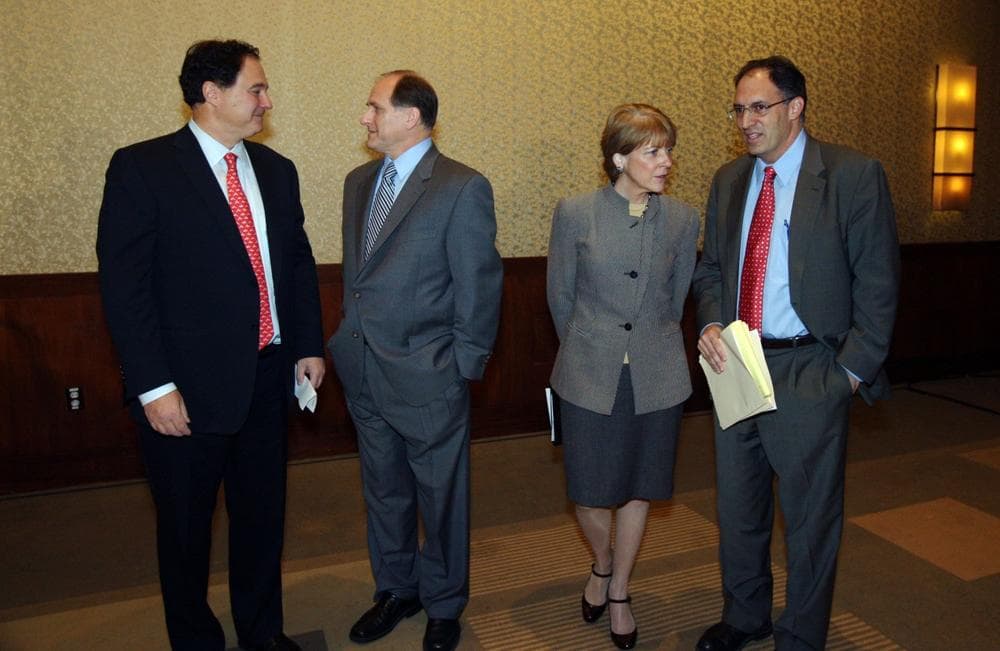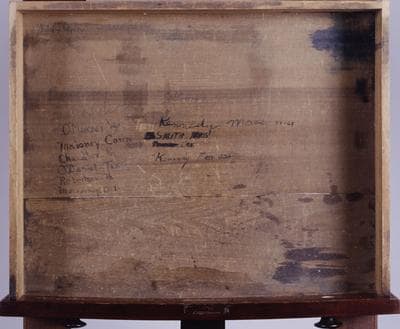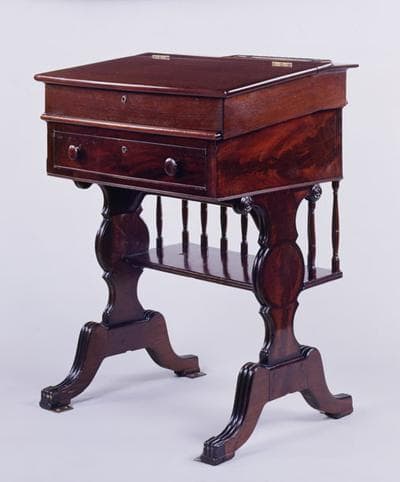Advertisement
Senate Hopefuls Struggle To Emerge From Kennedy's Shadow
Resume
The seat left open by the death of Sen. Edward M. Kennedy has also been held by John Quincy Adams, Daniel Webster and John Fitzgerald Kennedy. It’s the first time the seat has been open since 1962. You’d think that this race would be full of passion and fury.
But a Suffolk University poll a few days ago reveals that most people don’t even know what month the primaries are, and they’re three weeks away. Scott Ferson, Kennedy’s press secretary, says the race has so far been more about the predecessor than the successor.
"Ted Kennedy, through his illness and death and funeral, sucked up so much of the attention and the coverage," Ferson says, "it’s natural to want to connect this race as sort of the next chapter in the Ted Kennedy story."

To varying degrees, the wannabe replacements have been trying to write themselves into Kennedy’s story. The Democratic frontrunner, Attorney General Martha Coakley, says she wouldn’t even be running were it not for Kennedy’s work against sexual discrimination:
"I think whoever gets elected will ask himself — or herself in my case — what would Ted have done in this instance?" Coakley says. "Where would he have gone?"
But Democrat Rep. Michael Capuano says he doesn’t need to ask himself "What Would Kennedy Do?" because he’s already doing it — as a congressman.
"Bringing home the bacon," Capuano says. "I know that’s a tough term. Some people never want to hear that. Well, guess what, Ted Kennedy did it for years — proudly, rightly. And I think if we don’t replace him with someone who knows how to do it, this state will suffer."
Other candidates invoke the senator’s social change. Alan Khazei founded City Year, now part of the AmeriCorps service program. Khazei remembers seeing Ted Kennedy wear a red City Year jacket during his first public appearance after being diagnosed with brain cancer.

"I mean, here’s a man who’s dealing with brain cancer, who just was informed that he’s got a terminal illness, and he’s thinking enough to send a message to all the young people who are acting on their idealism," Khazei says. "I did, I got a tear in my eye. I did."
Another candidate, Stephen Pagliuca, who co-owns the Boston Celtics, likes to compare replacing Ted Kennedy with replacing the legendary Celtics coach Red Auerbach.
"Red’ll always be with us, and we’ll remember the good things about Red," Pagliuca says. "And Danny Ainge is trying to follow in his footsteps and has gotten one championship and will hopefully get some more."
Then there’s Scott Brown, a state senator whose good looks and overachieving family are reminiscent of the young Kennedy vitality. He just has the problem of running as a Republican to replace the Democratic figurehead. Jack E. Robinson is also running for the Republican nomination, but believes his stance on social issues is more closely aligned with Kennedy.
All this jockeying over Kennedy-esqueness has been maddening Massachusetts voters.
"Boy, they’re trying to be more Kennedy than the Kennedys!" says Kelley Kassa over fish and chips at an Irish pub in Brighton. Kassa says what she wants is a real hard debate, on the issues. But she says she’s not seeing it yet.
"It’s almost like watching five-year-olds play soccer," she says. "You know they all move around in a clump and you can’t tell who’s who and who’s doing what and who stands out."
Former Kennedy staffer and political analyst Scott Ferson says voters like Kelley Kassa are not necessarily looking to elect another Ted Kennedy, but they don’t want average senators either.
"Massachusetts has come to expect that its senators will not fit in, but will stand out," he says. "I mean, we expect them to run for president and we expect them to stand out. When you look at the Lodges, the Saltonstalls and the Kennedy brothers, Ed Brooke and Paul Tsongas and John Kerry, they all have carved their niche."
After all, Edward Kennedy was a junior senator in 1962. It took almost half a century to build his legislative legacy. If Massachusetts’ special election ever takes on a life of its own, voters will have a better chance of singling out a successor who might one day be able to say what Kennedy once said.
Someone pointed out to him that he held the same seat as Daniel Webster, the great orator. Ted Kennedy could just smile and say: "What did he ever do?"
This program aired on November 16, 2009.
